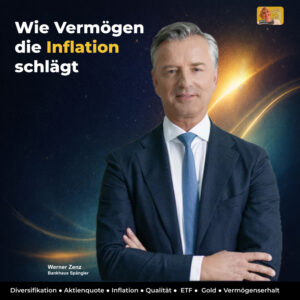
…. and this still means optimism for the stock market!
How come? After ten interest rate hikes, the US Federal Reserve – as expected – is not raising interest rates any further, and yet the leading American index, the Dow Jones, is actually falling slightly. The European Central Bank (ECB), on the other hand, is increasing – as expected – the key interest rate to four percent and European stocks are collapsing all the more. Why? Because the stock market anticipates the development of the real economy. And the capital markets expect that the US Federal Reserve will raise the current interest rates in two steps by the end of the year from five to 5.25 percent to 5.5 to 5.75 percent.
In my opinion, that is also very plausible, because they want to get a better grip on inflation. Because even if inflation is rising more slowly in the US than in the previous months, it is still 5.3 percent. Furthermore, coming back from the south of the USA, I can report that even the smallest shop there has a sign saying “We are hiring” stuck to many shop windows. And against wage-induced inflation, interest rate increases help to slow down the economy, the job offer and thus wages.
The ECB also intends to raise interest rates even further in July in order to get the high price increases under control, whatever the cost of growth. After all, the ECB is only responsible for price stability and not, like the FED, for unemployment.
CONCLUSION: As advised in the Börsenminute, Podcast-Episode of May 16: It is still not a good time to invest in long-dated US or European government bonds as long as interest rates are still rising and the prices of older, even lower-yielding bonds are falling. Apart from the increasing currency risk of US interest securities due to a rising euro, once the gap between US and European government bonds starts to narrow.
If, on top of that, the rate of inflation remains high and not even government bonds with five percent interest can beat inflation, long-term government bonds are certainly not the best investment. You're better off with stocks that are less sensitive to interest rates. Their companies are neither highly indebted nor have to make large investments.
However, the ECB's reaction also gives reason for OPTIMISM: Because if the EU Commission is only expecting growth of 0.9 percent for the EU in 2023 and the German economy is even shrinking, then it is probably expecting a strong recovery for 2024 . Otherwise it would hardly dare to slow down the poor economic situation even further by raising interest rates …
I am Julia Kistner, podcasthost of „Die Börsenminute“ – the stock market viewed from Europe. Nice to have listeners. Pleas support podcast Börsenminute by telling your friends of it and by suscribe to this podcast. Thank you so much!
Legal notice: This is the opinion of the author and not an investment recommendation. What you make of it is your business, Julia Kistner assumes no liability for this.
#Fed #ECB #interestrates #stocks #podcast






